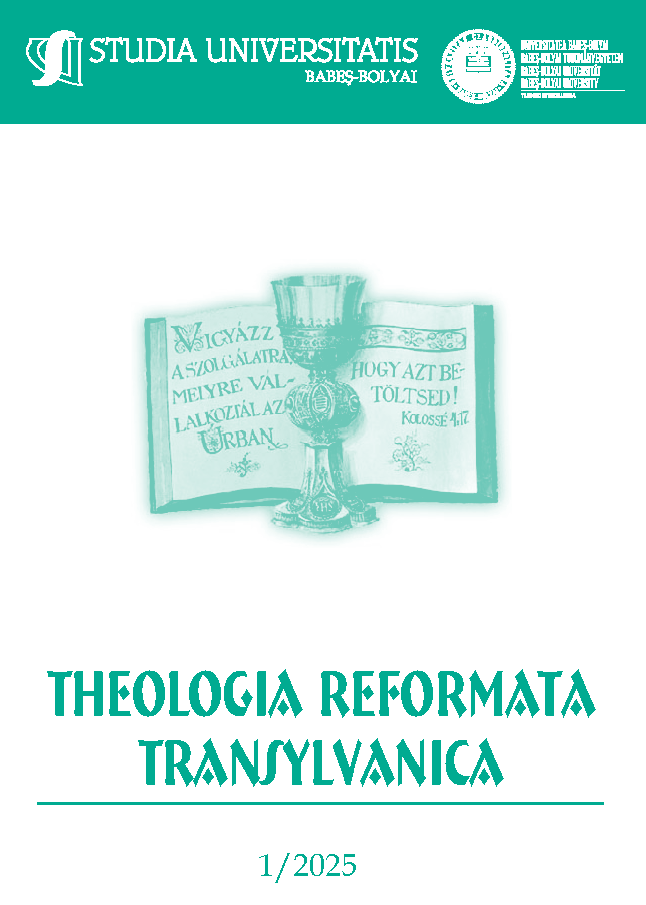The Communicative Dimensions of Incarnation and Sharing in Spiritual Counselling
DOI:
https://doi.org/10.24193/subbtref.70.1.15Keywords:
incarnation, spiritual care, sharing life, vulnerability, presence and authenticityAbstract
This paper explores the communicative dimensions of incarnation and self-giving within the framework of spiritual accompaniment, from both theological and psychological perspectives. At its core lies the thesis that the effectiveness of a helping relationship is not primarily rooted in methodological expertise but in the relational presence of the helper. Incarnation – understood as divine self-revelation through the human embodiment of Christ – serves as a paradigmatic model for pastoral conversation: the embodied, compassionate, and authentic presence of the helper becomes a vessel of divine grace. Drawing on key theological voices (Bonhoeffer, Barth, von Balthasar, Moltmann), pastoral psychology (Nouwen, Palmer, Root), and person-centred therapy (Rogers), the study illuminates the psychosocial and spiritual dynamics of self-giving, vulnerability, and authentic communication. In this context, self-giving is not interpreted as a loss of self but rather as a conscious choice for presence, relationality, and mutual participation. Vulnerability is redefined not as weakness but as the precondition for genuine encounter and spiritual openness. The study demonstrates that incarnational presence and lived vulnerability foster a climate of trust and openness in which mutual transformation becomes possible. Through the sharing of life and presence, a sacred space emerges in which divine proximity can be experienced. The helper is not merely a professional guide but becomes a sign of divine love and relational fidelity. In this sense, the helping conversation transcends instrumental function and becomes a spiritual process that integrates psychological insight, relational depth, and transcendent meaning. This incarnational approach thus provides a holistic framework for pastoral care, wherein the act of accompanying others becomes itself a form of witnessing and embodiment of the divine.
References
BALTHASAR, Hans von (1998): Theo-drama. Theological Dramatic Theory. San Francisco, Ignatius Press.
BARTH, Karl (2004): Church Dogmatics. IV/2. Bloomsbury T&T Clark.
BONHOEFFER, Dietrich (1979): The Cost of Discipleship. New York, Macmillan Publishing Co., Inc.
BROWN, Brené (2010): The Gifts of Imperfection. Center City, Hazelden Publishing.
(2012): Daring Greatly. New York, Gotham Books.
BUBER, Martin (1937): I and Thou. Edinburgh, T & T Clark.
GOLEMAN, Daniel (2006a): Social Intelligence: The New Science of Human Relationships. New York, Bantam Books.
(2006b): Emotional Intelligence. New York, Bantam Books,
HILLMAN, James (1998): Insearch: Psychology and Religion. Los Angeles, Spring Publications.
MOLTMANN, Jürgen (1973): Der gekreuzigte Gott. Munich, Christian Kaiser Verlag.
(1993): The Crucified God. The Cross of Christ as the Foundation and Criticism of Christian Theology. New York, First Fortress Press.
NOUWEN, Henri (1979): The Wounded Healer. Ministry in Contemporary Society. Montgomery, Image Books.
PALMER, Parker (1998): The Courage to Teach. San Francisco, Jossey-Bass.
(2004): A Hidden Wholeness: The Journey Toward an Undivided Life. San Francisco, Jossey-Bass.
ROGERS, Carl R. (1957): The Necessary and Sufficient Conditions of Therapeutic Personality Change. In: Journal of Consulting Psychology. 21, 2. 100. Available at: https://doi.org/10.1037/h0045357 (accessed on: 10.02.2025).
(1961): On Becoming a Person: A Therapist’s View of Psychotherapy. Boston, Houghton Mifflin.
(1980): A Way of Being. Boston, Houghton Mifflin.
(2021): Writings on Client Centered Therapy. Some Hypotheses Regarding the Facilitation of Personal Growth. Mockingbird Press, Augusta. [e-book].
ROHR, Richard – MORRELL, Mike (2018): Az isteni tánc. A Szentháromság és a belső átalakulás. Ursus Libris.
ROOT, Andrew (2013): The Relational Pastor. Sharing in Christ by Sharing Ourselves. Illinois, Downers Grove, Inter Varsity Press.
YALOM, I. D. (1989): Love’s Executioner and Other Tales of Psychotherapy. New York, Basic Books.
(2004): Egzisztenciális pszichoterápia. Budapest, Animula Kiadó.
Downloads
Published
How to Cite
Issue
Section
License
Copyright (c) 2025 Studia Universitatis Babeș-Bolyai Theologia Reformata Transylvanica

This work is licensed under a Creative Commons Attribution-NonCommercial-NoDerivatives 4.0 International License.



